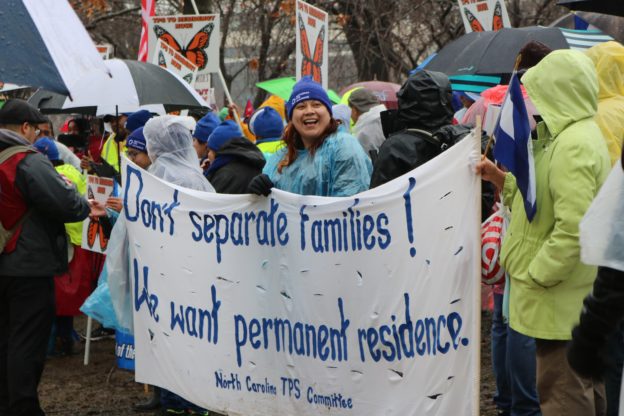
Invitation to Congress: Marriage of TPS and DREAM
José Arnulfo Cabrera
February 26, 2019
On February 12, Temporary Protected Status (TPS) holders took to the streets of Washington, D.C. demanding Congress to pass legislation that would give them a pathway to citizenship, after the Trump Administration pressured the Department of Homeland Security (DHS) to deny their document renewals. TPS holders who have been in the U.S. for years, some since 1990, all of sudden now face the potential reality of going back to their native countries or becoming undocumented.
Temporary Protected Status was first enacted by the Immigration Act of 1990, which reformed our immigration system. One of the many things the bill created was away for foreign nationals who couldn’t legally be defined as refugee or asylee (but without a doubt fleeing, reluctant to return, or unable to return to their home country due to violence) to attain legal status. TPS allowed individuals to be granted work authorization without being deported. The first group to be granted TPS was Salvadoran nationals. As time went on more foreign nationals were granted status and now people from ten countries are eligible to receive TPS.
For almost 29 years, TPS holders have been living successfully in the U.S. They have started families and careers, and have contributed to American society, but now are fighting to stay in their new home with the families and lives they’ve created. TPS holders and recipients (also called DREAMers) both find themselves in danger of losing their status and having to leave the U.S., or become undocumented. Like TPS holders, DACA recipients have been living in the U.S. for years and only in the past seven years have they had some form of status that allowed them to work in the U.S. Last Congress, multiple bills were introduced that would have “fixed” the problem the Trump Administration created. Of all the bills introduced, only two bills would have given DACA recipients and TPS holders a pathway to citizenship: the American Promise Act would have given TPS holders a pathway to citizenship and the DREAM Act would have given DACA recipients, as well as some who didn’t fit the age requirement, a pathway to citizenship.
This congress is different. Not only do the faces of Congress look different, but so are the bills they’re introducing. Instead of having two separate bills that would give TPS holders and DACA recipients a pathway to citizenship, the house will introduce a single bill that will give both a pathway to citizenship! While the specifics of this bill are not public yet, the bill will pave the way for comprehensive immigration reform. Hopefully, the House Judiciary Committee will soon have a hearing that will allow Members of Congress to know more about the people facing the issue, so that they can then move the bill forward.
TPS holders and DACA recipients have always been here, and they’ve always been a part of American society. Sorry to those who just noticed us, but we’re not leaving — because this is home for us.







